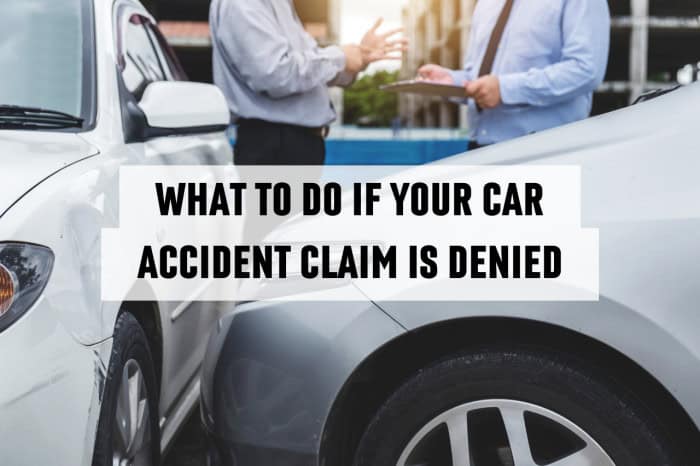Car accidents can be traumatic experiences, and the aftermath often involves dealing with insurance companies to receive compensation for injuries and damages. However, what happens if your car accident claim is denied? This article will guide you through the steps to take if you find yourself in this frustrating situation.

Understand the Reason for Denial
First, you will need to find out why your claim was denied. In such cases, insurance companies must provide you with a written explanation for the decision. According to Michael Kelly car accident lawyer, common reasons for claim denials include:
- Policy exclusions
- Lapsed coverage
- Disputed liability
- Lack of sufficient evidence
- Late filing
- Suspicion of fraud.
Review your denial letter carefully. If the reason isn’t clear, contact the insurance company for clarification.
Review Your Policy
Once you know the reason for the denial, review your insurance policy. Insurance contracts can be complex, so pay close attention to the coverage details, exclusions, and limitations. Look for any discrepancies between the denial reason and your policy terms.
Gather Additional Evidence
If your claim was denied due to insufficient evidence, collect more information to support your case. This may include:
- Additional photos of the accident scene and vehicle damage
- Witness statements
- Police reports
- Medical records and bills
- Expert opinions (e.g., accident reconstruction specialists).
Strong evidence can make a significant difference in overturning a denial.
File an Appeal
Most insurance companies have an appeals process. Follow these steps to file an appeal:
- Write a formal appeal letter: Clearly state why you believe the denial was incorrect, referencing your policy and providing any new evidence.
- Include supporting documents: Attach all relevant evidence and documentation to strengthen your case.
- Set a deadline: Request a response within a specific timeframe, typically 30 days.
- Keep records: Document all communication with the insurance company, including dates, times, and names of representatives you speak with.
Consider Mediation
If your appeal is unsuccessful, consider mediation. It involves a neutral third party who helps facilitate a resolution between you and the insurance company. Mediation is an alternative to going to court that can save time and money.
File a Complaint with Your State Insurance Department
If you believe the insurer is acting in bad faith, file a complaint with your state’s insurance department. They can investigate the claim and potentially intervene on your behalf.
Here’s a table outlining common bad-faith practices and their implications:
| Bad Faith Practice | Description | Potential Consequences |
| Unreasonable delays | Purposely prolonging the claims process | Additional compensation for financial hardship caused by delays |
| Inadequate investigation | Failing to thoroughly investigate the claim | Requirement to re-evaluate the claim with proper investigation |
| Misrepresentation of policy terms | Incorrectly stating policy coverage or exclusions | Possible policy reformation or additional damages |
| Low-ball settlement offers | Offering settlements far below the claim’s value | Punitive damages in some jurisdictions |
| Failure to explain denial | Not providing clear reasons for claim denial | Potential reversal of denial decision |

Consult with a Personal Injury Attorney
If you’ve exhausted other options, it’s time to consult a personal injury attorney. They can:
- Evaluate your case: An experienced attorney can assess the strength of your claim and advise on the best course of action.
- Negotiate with the insurance company: Attorneys often have experience dealing with insurers and can negotiate more effectively.
- File a lawsuit: If negotiations fail, your attorney can file a lawsuit against the insurance company.
- Represent you in court: Should your case go to trial, your attorney will present your case and fight for fair compensation.
Consider Legal Alternatives
Depending on your situation, you may have other legal options:
- Sue the at-fault driver directly: If the other driver was responsible for the accident, you might be able to sue them personally.
- Uninsured/underinsured motorist claim: If you have this coverage, you may be able to file a claim with your own insurance company.
- Bad faith lawsuit: If the insurance company acted in bad faith, you might have grounds for a separate lawsuit against them.
Prevent Future Claim Denials
While dealing with a denied claim is challenging, you can take steps to prevent future denials:
- Understand your policy: Familiarize yourself with your coverage, limits, and exclusions.
- Document accidents thoroughly: Take photos, gather witness information, and file a police report.
- Report accidents promptly: Inform your insurer about the situation right away.
- Be honest: Make sure you only give accurate information about the accident and your injuries.
- Keep records: Maintain copies of all accident-related documents and communication with your insurer.
A denied car accident claim can be disheartening, but it’s not the end of the road. With the right approach, it’s still possible to fight for the compensation you deserve.
Remember, persistence and thorough documentation are key to overturning a claim denial. Don’t hesitate to seek professional help if you feel overwhelmed or unsure about the process. With the right approach and resources, you can navigate the challenges of a denied claim and work towards a fair resolution.

